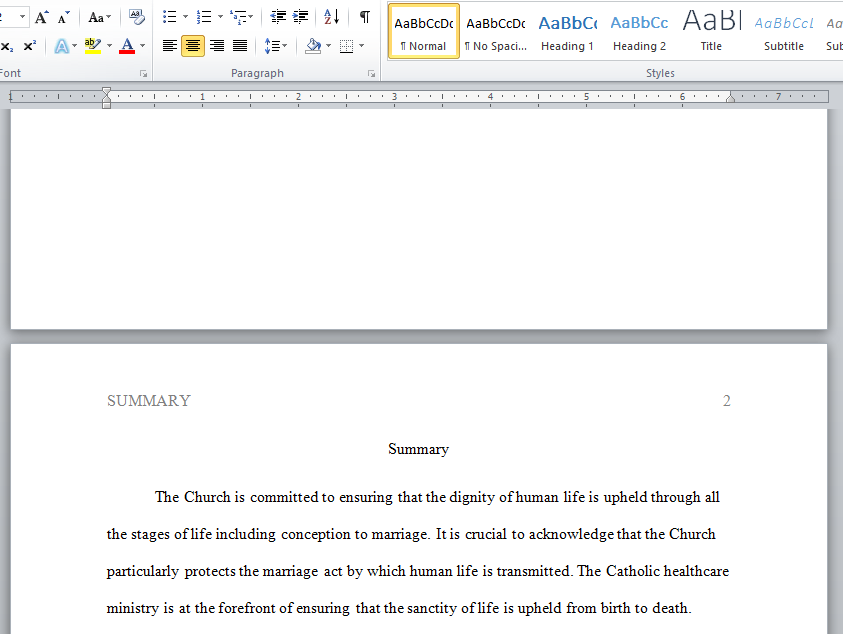Write a summary on Ethical and Religious Directives for Catholic Health Care Services
Ethical and Religious Directives for Catholic Health Care Services, 6th Edition. (2018) U.S. Conference of Catholic Bishops. Washington, DC.
Issues in Care for the Beginning of Life
Introduction The Church’s commitment to human dignity inspires an abiding concern for the sanctity of human life from its very beginning, and with the dignity of marriage and of the marriage act by which human life is transmitted. The Church cannot approve medical practices that undermine the biological, psychological, and moral bonds on which the strength of marriage and the family depends. Catholic health care ministry witnesses to the sanctity of life “from the moment of conception until death.” 20 The Church’s defense of life encompasses the unborn and the care of women and their children during and after pregnancy. The Church’s commitment to life is seen in its willingness to collaborate with others to alleviate the causes of the high infant mortality rate and to provide adequate health care to mothers and their children before and after birth. The Church has the deepest respect for the family, for the marriage covenant, and for the love that binds a married couple together. This includes respect for the marriage act by which husband and wife express their love and cooperate with God in the creation of a new human being. The Second Vatican Council affirms:
This love is an eminently human one. . . . It involves the good of the whole person. . . . The actions within marriage by which the couple are united intimately and chastely are noble and worthy ones. Expressed in a manner which is truly human, these actions signify and promote that mutual self-giving by which spouses enrich each other with a joyful and a thankful will.21 Marriage and conjugal love are by their nature ordained toward the begetting and educating of children. Children are really the supreme gift of marriage and contribute very substantially to the welfare of their parents. . . . Parents should regard as their proper mission the task of transmitting human life and educating those to whom it has been transmitted. . . . They are thereby cooperators with the love of God the Creator, and are, so to speak, the interpreters of that love.22
For legitimate reasons of responsible parenthood, married couples may limit the number of their children by natural means. The Church cannot approve contraceptive interventions that “either in anticipation of the marital act, or in its accomplishment or in the development of its natural consequences, have the purpose, whether as an end or a means, to render procreation impossible.”23 Such interventions violate “the inseparable connection, willed by God . . . between the two meanings of the conjugal act: the unitive and procreative meaning.”24 With the advance of the biological and medical sciences, society has at its disposal new technologies for responding to the problem of infertility. While we rejoice in the potential for
17
Ethical and Religious Directives for Catholic Health Care Services, Sixth Edition
good inherent in many of these technologies, we cannot assume that what is technically possible is always morally right. Reproductive technologies that substitute for the marriage act are not consistent with human dignity. Just as the marriage act is joined naturally to procreation, so procreation is joined naturally to the marriage act. As Pope John XXIII observed:
The transmission of human life is entrusted by nature to a personal and conscious act and as such is subject to all the holy laws of God: the immutable and inviolable laws which must be recognized and observed. For this reason, one cannot use means and follow methods which could be licit in the transmission of the life of plants and animals.25 Because the moral law is rooted in the whole of human nature, human persons, through intelligent reflection on their own spiritual destiny, can discover and cooperate in the plan of the Creator.26
Answer preview :

Word limit : 305
